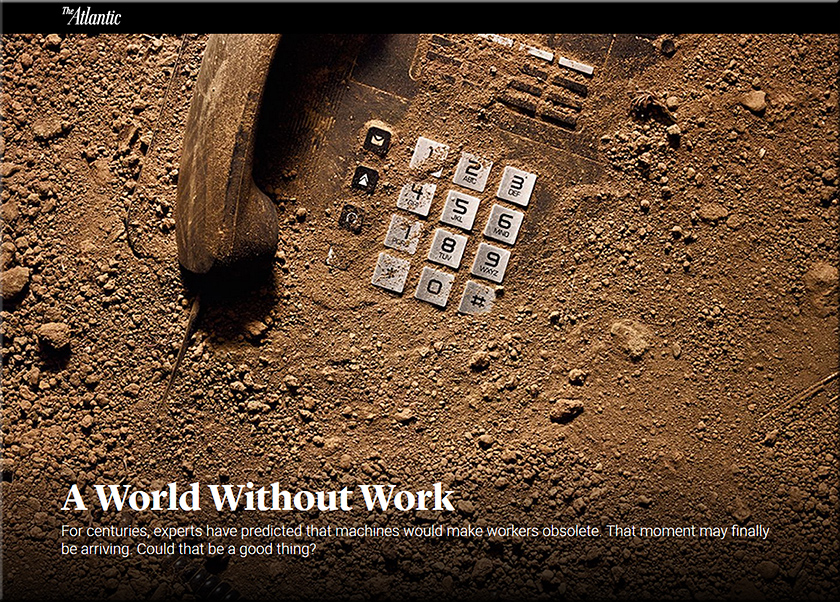A world without work — by Derek Thompson; The Atlantic — from July 2015
Excerpts:
Youngstown, U.S.A.
The end of work is still just a futuristic concept for most of the United States, but it is something like a moment in history for Youngstown, Ohio, one its residents can cite with precision: September 19, 1977.
For much of the 20th century, Youngstown’s steel mills delivered such great prosperity that the city was a model of the American dream, boasting a median income and a homeownership rate that were among the nation’s highest. But as manufacturing shifted abroad after World War II, Youngstown steel suffered, and on that gray September afternoon in 1977, Youngstown Sheet and Tube announced the shuttering of its Campbell Works mill. Within five years, the city lost 50,000 jobs and $1.3 billion in manufacturing wages. The effect was so severe that a term was coined to describe the fallout: regional depression.
Youngstown was transformed not only by an economic disruption but also by a psychological and cultural breakdown. Depression, spousal abuse, and suicide all became much more prevalent; the caseload of the area’s mental-health center tripled within a decade. The city built four prisons in the mid-1990s—a rare growth industry. One of the few downtown construction projects of that period was a museum dedicated to the defunct steel industry.
…
“Youngstown’s story is America’s story, because it shows that when jobs go away, the cultural cohesion of a place is destroyed”…
…
“The cultural breakdown matters even more than the economic breakdown.”
…
But even leaving aside questions of how to distribute that wealth, the widespread disappearance of work would usher in a social transformation unlike any we’ve seen.
…
What may be looming is something different: an era of technological unemployment, in which computer scientists and software engineers essentially invent us out of work, and the total number of jobs declines steadily and permanently.
…
After 300 years of people crying wolf, there are now three broad reasons to take seriously the argument that the beast is at the door: the ongoing triumph of capital over labor, the quiet demise of the working man, and the impressive dexterity of information technology.
…
The paradox of work is that many people hate their jobs, but they are considerably more miserable doing nothing.
…
Most people want to work, and are miserable when they cannot. The ills of unemployment go well beyond the loss of income; people who lose their job are more likely to suffer from mental and physical ailments. “There is a loss of status, a general malaise and demoralization, which appears somatically or psychologically or both”…
…
Research has shown that it is harder to recover from a long bout of joblessness than from losing a loved one or suffering a life-altering injury.
…
Most people do need to achieve things through, yes, work to feel a lasting sense of purpose.
…
When an entire area, like Youngstown, suffers from high and prolonged unemployment, problems caused by unemployment move beyond the personal sphere; widespread joblessness shatters neighborhoods and leaches away their civic spirit.
…
What’s more, although a universal income might replace lost wages, it would do little to preserve the social benefits of work.
…
“I can’t stress this enough: this isn’t just about economics; it’s psychological”…
The paradox of work is that many people hate their jobs, but they are considerably more miserable doing nothing.
From DSC:
Though I’m not saying Thompson is necessarily asserting this in his article, I don’t see a world without work as a dream. In fact, as the quote immediately before this paragraph alludes to, I think that most people would not like a life that is devoid of all work. I think work is where we can serve others, find purpose and meaning for our lives, seek to be instruments of making the world a better place, and attempt to design/create something that’s excellent. We may miss the mark often (I know I do), but we keep trying.









